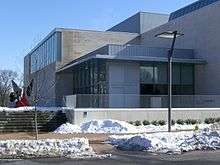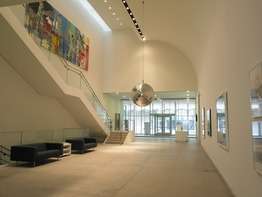Mildred Lane Kemper Art Museum
 | |
| Location | St. Louis, Missouri |
|---|---|
| Type | Art museum |
| Curator | Sabine Eckmann |
| Website | http://kemperartmuseum.wustl.edu |
The Mildred Lane Kemper Art Museum is an art museum located on the campus of Washington University in St. Louis, within the university's Sam Fox School of Design & Visual Arts. It was founded in 1881 as the St. Louis School and Museum of Fine Arts, and initially located in a building in downtown St. Louis. It is the oldest art museum west of the Mississippi River.[1] Its collection was formed in large part by acquiring significant works by artists of the time, a legacy that continues today. The Museum contains strong holdings of 19th-, 20th-, and 21st-century European and American paintings, sculptures, prints, installations, and photographs. The collection also includes some Egyptian and Greek antiquities, Old Master prints, and the Wulfing Collection of approximately 14,000 ancient Greek, Roman, and Byzantine coins.
The museum moved to its current home, designed by Pritzker Prize-winner Fumihiko Maki,[2] in 2006.
Foundation and Early Years
The museum was established in 1881 as part of Washington University in St. Louis, under the name of the St. Louis School and Museum of Fine Arts. Halsey C. Ives served as the museums first director, and during his tenure, the collection focused on contemporary American artists, notably William Merritt Chase.
In 1905, St. Louis banker Charles Parsons donated his private collection to the museum; this donation included pieces by Frederic Edwin Church, and established the museum as a major holder of contemporary American art.
In 1906, the museum was relocated to the Palace of Fine Arts in Forest Park, where it was housed until 1909. In that year, the City Museum of Art was formed, and began to acquire works separately from the private university collection. The university collection would remain "on loan" to the public museum until 1960.

The Janson Years
In 1941, H.W. Janson joined the museum and began to focus on collecting contemporary European artwork, particularly examples of Cubism, Expressionism and Surrealism. In order to finance this project, he organized the sale of over 600 objects. Notable acquisitions during this period include works by Pablo Picasso, Max Ernst and Juan Gris. Janson also arranged for a permanent home for the museum's collection, and in 1960, the museum moved to Steinberg Hall, located on the main university campus. At this time, the museum was also renamed as the Washington University Gallery of Art.
Recent
Recently, the museum has continued to focus on the acquisition of contemporary works, including pieces by Jackson Pollock, Robert Rauschenberg and Jenny Holzer. In 2004, the museum was again renamed, this time as the Mildred Lane Kemper Art Museum, as a division of the new Sam Fox School of Visual Art and Design. Two years later, in 2006, the museum moved to a new building adjacent to the old Steinberg Hall. The 65,000-square-foot (6,000 m2) expansion was designed by Fumihiko Maki, and is also home to the Washington University Art and Architecture library and the department of Art History and Archaeology.
The Kemper Art Museum is currently part of the Sam Fox School of Design & Visual Arts at Washington University, which comprises the College of Art, the College of Architecture, and the Kemper Art Museum. The Sam Fox School was established in 2005 to link strong studio programs in modern art and architecture with the resources and programs of the Museum. Creation of the Sam Fox School follows a nearly $60 million investment in new and renovated art, architecture, and museum facilities. The five-building complex includes two new buildings by Pritzker Prize-winning architect Fumihiko Maki, including the Mildred Lane Kemper Art Museum building.
The Sam Fox School is dedicated to the creation, study, and exhibition of multidisciplinary and collaborative work with an emphasis on fostering creativity and intellectual exchange.
Exhibits

The Mildred Lane Kemper Art Museum has four exhibition spaces: the Barney A. Ebsworth Gallery, Garen Gallery, Bernoudy Permanent Collection Gallery, and teaching gallery. Some exhibitions include To See Without Being Seen: Contemporary Art and Drone Warfare, Rashid Johnson: Message to Our Folks, and Notations: Contemporary Drawing as Idea and Process.
The permanent collection of the museum, on the top floor, includes original works such as Daniel Boone Escorting Settlers through the Cumberland Gap, painted by George Caleb Bingham.[3]
Newman Money Museum
The Newman Money Museum opened October 25, 2006 on the bottom floor of the Mildred Lane Kemper Art Museum. The museum includes an exhibition space as well as a numismatics library and scholarly work space.[4] The collection was donated by American numismatist Eric P. Newman and his wife Evelyn Newman, containing a broad array of coin and paper money, but primarily focusing on Colonial and early American money. The museum is curated by Tom Serfass and also features items documenting Benjamin Franklin's role as a figure of early American Colonial paper money. Exhibits have also focused on lasting influence of Spanish specie coinage, depiction of women and African-Americans on money, and creation and production of money including sketches, a collection of coin counters and changers, and rare examples of printing errors.[5]
Notes
- ↑ A Gallery of Modern Art. Edited by Jane Neidhart, St. Louis: Washington University, 1994.
- ↑ Saltzstein, Dan (June 24, 2010). "36 Hours in St. Louis". The New York Times.
- ↑ "Daniel Boone Escorting Settlers through the Cumberland Gap". Mildred Lane Kemper Art Museum. Archived from the original on August 28, 2006. Retrieved January 31, 2009.
- ↑ Duffy, Robert W. "Evelyn Edison Newman: Creative philanthropist made it fun for others to contribute". Retrieved 2016-08-26.
- ↑ "Newman Money Museum to open at Washington University in St. Louis Oct. 25 | The Source | Washington University in St. Louis". 2006-10-17. Retrieved 2016-08-26.
References
- A Gallery of Modern Art. Joseph Kettner. Washington University: St. Louis, 1994.
External links
- Mildred Lane Kemper Art Museum official website
- Newman Money Museum official website
- Newman Numismatics Portal
